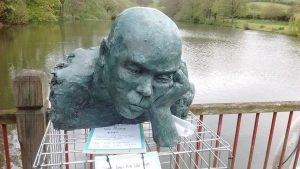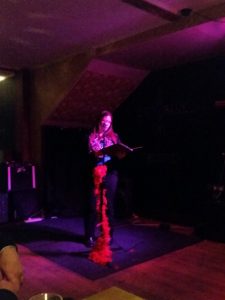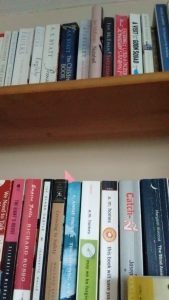This Week’s Bit of String:
‘When he offers me a ring—any day now—it had better have a four-figure price tag. If it’s tacky or gold, I’m not touching it.’ The senior boasted to a couple of us freshmen, curling her lip as she watched her alleged almost-fiance bantering with the younger students.
He was a student himself, so how he managed to scrape enough funds for a ring, I’m not sure. I didn’t know either of them well. Maybe, friendly as he seemed, he’d let her down before, so she needed a deposit on her love. Or he could have had a hidden source of wealth–possibly something she’d helped him scheme to get, a Macbeth-type plot they both colluded in.
At the time, I was chronically single, and the girl’s demands rankled. Why did she have a partner when I did not? How did she get away with such an unyielding attitude?
I’ve been considering the balance of demands and the possible merits of being artistically unyielding as I query agents on behalf of my novel, The Wrong Ten Seconds. I’ve had kind, personal, so-close-but-not-quite rejections from very big agents. It’s nearly time to try a few more.
Before I do, I want to adjust the first couple of pages. We all know how important those are, and I’m not naive enough to think I can do whatever I like with them.
First Page Requirements
If you are also a writer, you’ve probably done a tonne of research on this already. Here are just a couple of sample blogs on how to, or how not to, write a great first page. Your story must feature in its opening:
*A sympathetic and intriguing protagonist
*No more than two characters; avoid overload.
*Unique voice
*Accessible, appealing style
*An indication of setting that is, again, simultaneously exciting yet familiar, clearly conveyed yet concisely described.
*At least a sense of the conflict or need driving the action. That’s the hook.

How do we perform that balancing act between introducing excitement yet setting the scene and not overwhelming the reader? How do we introduce something original while keeping it conventional enough so the agent spots its appeal to a wide market? What if, as in my novel, the inciting action takes place in a somewhat crowded place so you have to introduce a few characters while enabling it all to kick off in a timely fashion?
Honestly, I don’t know. We each have our own first pages we need to write; our own beloved characters and settings to sell, our own ever-evolving hooks and our own special styles and voices to develop. To get there, we practise constantly, and weigh every phrase.
At the point when this challenge feels more impossible than rewarding, I sometimes fall prey to some mental whining. I think about the many books I’ve read, classic or contemporary, which haven’t followed those rules and made excessive demands of the reader. Does that happen to anyone else?
Rule Breakers
When I pick up a book, I don’t expect to be gripped instantly. I know the story’s engine takes a few pages to go from naught to sixty. Apart from reading on my bus commute, my big reading time is on the treadmill, and I always ensure I’m a chapter or two in before I take a book running. Otherwise it will never take my mind off the Herculean effort I’m sweating out.
So why do other people expect instant gratification? And what about all those cases where it takes more than a page or two before anything really happens?

Looking at this sample roundup of great first lines, many of them are beautiful, or quirky, but not necessarily exciting. Great opening lines don’t have to be super suspenseful. I put Margaret Atwood and Louis de Bernieres in my list of most reliable openers. One of their books I could probably take on the treadmill from the first line (and Lee Child, but shh don’t tell).
These writers have proved their worth and can take as much time as they like to spin their tale. But what about novice ones that have hit it big? A few times I’ve picked up an acclaimed book only to find myself trudging through it. Even if the first sentence is interesting, the plot ends up creaking with excessive padding, as if it’s waddling forth in a sumo suit. Ahem, The Miniaturist…
The book may be so gritty it doesn’t offer a single tolerable character—Casual Vacancy, anyone? Or so edgy it’s almost unintelligible.
That last is my current problem. I’m reading A Girl is a Half-Formed Thing by Eimear Mcbride, and I’m struggling. I like a challenge, and unique stylistic choices can be great. But usually there’s a reason for them, as in Deborah Levy’s Hot Milk, for example, where the switching between present and past tense narration is confidently, briefly alluded to in the narrator’s own self-analysis. But in the case of McBride’s prizewinning novel, the haphazard language and lack of complete sentences for 205 pages straight (I’m really counting them down) has no discernible link to the main character’s voice. If anyone else has spotted it, please do let me know.
This isn’t to say the book’s not effective. Sure, I’m a bit jealous, but I have to admire Ms. McBride for her unyielding loyalty to her ideas. She screwed her courage to the sticking post. And although I don’t think the inscrutable character or somewhat conventional plot will linger with me, the language. Does. Sharp pebbles river rolling through mind. Stale tired breath against.
Still, even if I wanted to attempt it—how would I ever get away with it?


















